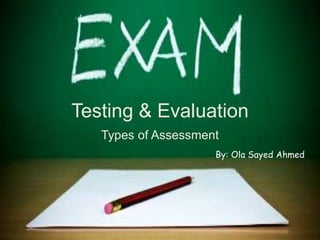Language Assessment Types
- 1. Testing & Evaluation Types of Assessment By: Ola Sayed Ahmed
- 2. Assessment Assessment is the ways instructors gather data about their teaching and their students’ learning (Hanna & Dettmer, 2004). E.g. pre-tests, observations, and examinations. Evaluation: a judgment of the instructor on the overall outcome of a certain student based on the assessment data.
- 3. Informal Assessment Informal assessments are those assessments that result from teachers spontaneous day-to-day observations of how students behave and perform in class. Non-standardaized Students are not aware of them No scores. No comparing to other students. Classroom environment. Less structured. May not be validated or tested for reliability.
- 4. Informal Assessment Examples of informal assessment are: Observation 5 minute quiz Writing activity Interviews Performance reviews Can you provide more examples?
- 5. Strength of Informal Assessment Without a lot of planning less stressful for the students receive immediate data and then plan accordingly give the most accurate measure of a students true ability.
- 6. Weakness of Informal Assessment any hidden prejudices Students are not giving their 100 % motivation
- 7. Formal Assessment a systematic way to evaluate how well students are progressing in a particular instructional program. Standardized tests Students are aware of them Scores are considered Scores are compared Could go beyond classroom environment. structured Are validated or tested for reliability.
- 8. Formal Assessment Examples of formal assessment are: Final exams Graded homework Chapter tests Research paper Can you provide more examples?
- 9. Strenght of Formal Assessments Concrete and measurable evidence of learning. Formal Assessment helps to sort students.
- 10. Weakness of Formal Assessments Formal Assessment may be stressful. Flawed test construction.
- 11. Diagnostic Assessment Diagnostic assessment can help you identify your students’ current knowledge of a subject, their skill sets and capabilities, and to clarify misconceptions before teaching takes place (Just Science Now!, n.d.). can involve: formal measurements (e.g. IQ/aptitude tests, fitness tests) that are used to establish a starting point or baseline. informal measurements (e.g. observation, discussions, questioning)
- 12. Diagnostic Assessment Types of Diagnostic Assessment: Pre-tests Self-assessment Discussion Responses Interviews
- 13. Formative Assessment “it takes a good deal of support and courage for teachers to turn around their practices from being test oriented to being learning-oriented” Harlen 2005
- 14. Formative Assessment Formative assessment provides feedback and information during the instructional process, while learning is taking place, and while learning is occurring.
- 15. Formative Assessment Types of Formative Assessment: Observation during class activities Homework exercises Question & answer session (formal & informal) Warm ups
- 16. Summative Assessment Summative assessment takes place after the learning has been completed and provides information and feedback that sums up the teaching and learning process. It is product-oriented focusing on the last product of teaching. Rubrics are often involved to tell the students what is expected from them.
- 17. Summative Assessment Types of Summative Assessment: Examination Final examination Term papers Course evaluation Projects Performance Standardized testing: TOEIC - Test of English for International Communication TOEFL - Test of English as a Foreign Language IELTS - International English Language Testing System
- 18. Refrences Harlen, Wynne. "Teachers' summative practices and assessment for learning– tensions and synergies." Curriculum Journal 16.2 (2005): 210. Just Science Now! (n.d.). Assessment-inquiry connection.http://www.justsciencenow.com/ass essment/index.htm http://www.niu.edu/facdev/resources/guide/ass essment/formative%20and_summative_asses sment.pdf
- 19. Ola Sayed Ahmed



















